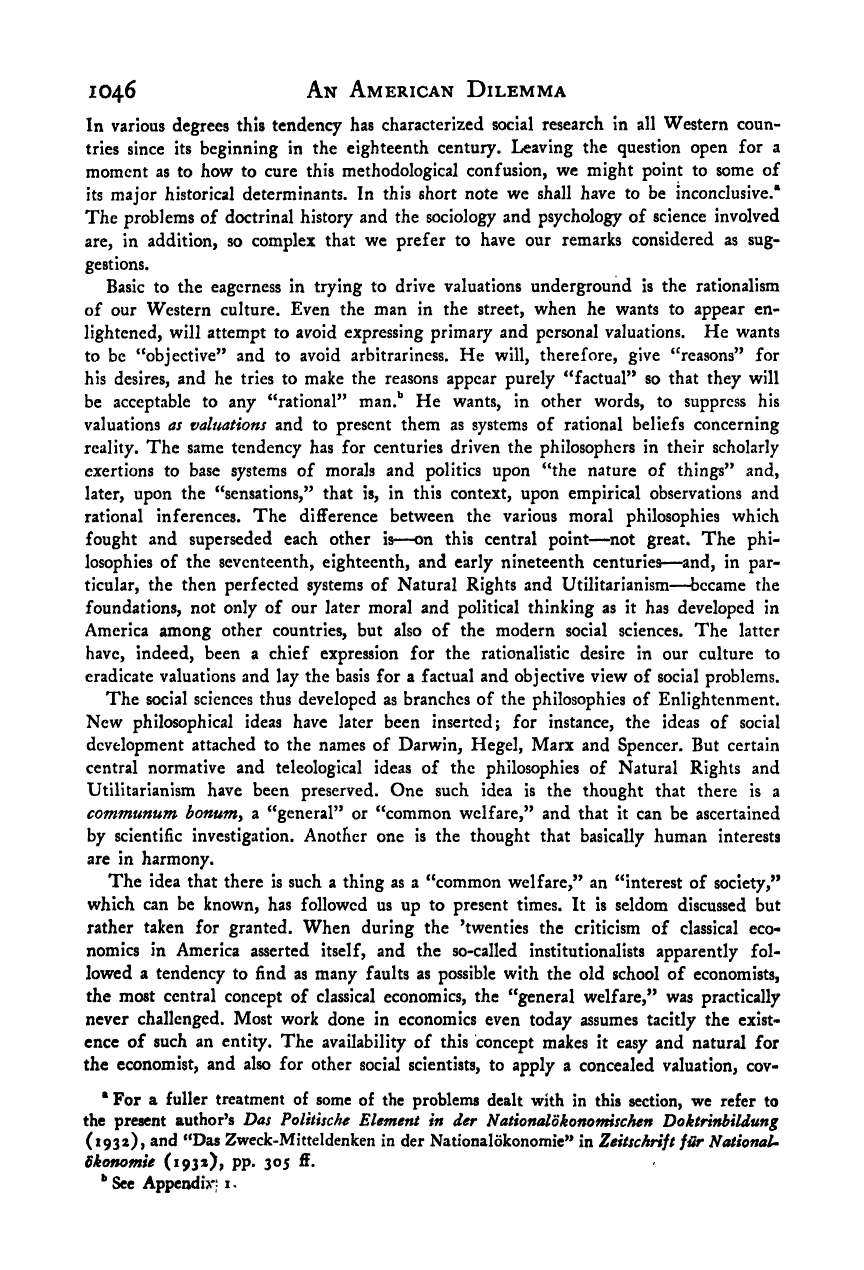Note: Gunnar Myrdal died in 1987, less than 70 years ago. Therefore, this work is protected by copyright, restricting your legal rights to reproduce it. However, you are welcome to view it on screen, as you do now. Read more about copyright.
Full resolution (TIFF) - On this page / på denna sida - Appendices - 2. A Methodological Note on Facts and Valuations in Social Science - 3. The History and Logic of the Hidden Valuations in Social Science

<< prev. page << föreg. sida << >> nästa sida >> next page >>
Below is the raw OCR text
from the above scanned image.
Do you see an error? Proofread the page now!
Här nedan syns maskintolkade texten från faksimilbilden ovan.
Ser du något fel? Korrekturläs sidan nu!
This page has never been proofread. / Denna sida har aldrig korrekturlästs.
1046 An American Dilemma
In various degrees this tendency has characterized social research in all Western coun-
tries since its beginning in the eighteenth century. Leaving the question open for a
moment as to how to cure this methodological confusion, we might point to some of
its major historical determinants. In this short note we shall have to be inconclusive.*
The problems of doctrinal history and the sociology and psychology of science involved
are, in addition, so complex that we prefer to have our remarks considered as sug-
gestions.
Basic to the eagerness in trying to drive valuations underground is the rationalism
of our Western culture. Even the man in the street, when he wants to appear en-
lightened, will attempt to avoid expressing primary and personal valuations. He wants
to be “objective” and to avoid arbitrariness. He will, therefore, give “reasons” for
his desires, and he tries to make the reasons appear purely “factual” so that they will
be acceptable to any “rational” man.** He wants, in other words, to suppress his
valuations as valuations and to present them as systems of rational beliefs concerning
reality. The same tendency has for centuries driven the philosophers in their scholarly
exertions to base systems of morals and politics upon “the nature of things” and,
later, upon the “sensations,” that is, in this context, upon empirical observations and
rational inferences. The difference between the various moral philosophies which
fought and superseded each other is—on this central point—not great. The phi-
losophies of the seventeenth, eighteenth, and early nineteenth centuries—and, in par-
ticular, the then perfected systems of Natural Rights and Utilitarianism—became the
foundations, not only of our later moral and political thinking as it has developed in
America among other countries, but also of the modern social sciences. The latter
have, indeed, been a chief expression for the rationalistic desire in our culture to
eradicate valuations and lay the basis for a factual and objective view of social problems.
The social sciences thus developed as branches of the philosophies of Enlightenment.
New philosophical ideas have later been inserted; for instance, the ideas of social
development attached to the names of Darwin, Hegel, Marx and Spencer. But certain
central normative and teleological ideas of the philosophies of Natural Rights and
Utilitarianism have been preserved. One such idea is the thought that there is a
communum bonum^ a “general” or “common welfare,” and that it can be ascertained
by scientific investigation. Another one is the thought that basically human interests
are in harmony.
The idea that there is such a thing as a “common welfare,” an “interest of society,”
which can be known, has followed us up to present times. It is seldom discussed but
rather taken for granted. When during the ’twenties the criticism of classical eco-
nomics in America asserted itself, and the so-called institutionalists apparently fol-
lowed a tendency to find as many faults as possible with the old school of economists,
the most central concept of classical economics, the “general welfare,” was practically
never challenged. Most work done in economics even today assumes tacitly the exist-
ence of such an entity. The availability of this concept makes it easy and natural for
the economist, and also for other social scientists, to apply a concealed valuation, cov-
* For a fuller treatment of some of the problems dealt with in this section, we refer to
the present author’s Das Politisch^ Element in ier Nationalokonomischen Doktrinbildung
(1932), and ‘*Das Zweck-Mitteldenken in der Nationalokonomie” in Zeitschrift fur National^
Skonomie (193*), pp. 305 ff.
**
See Appendix; i
<< prev. page << föreg. sida << >> nästa sida >> next page >>